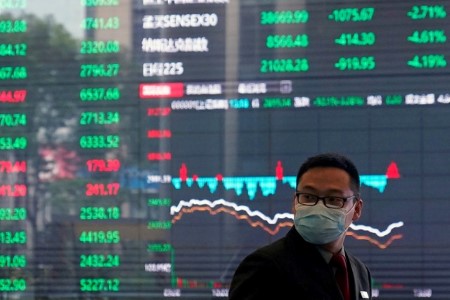




Inflation Update: Nowhere but up
 DOWNLOAD
DOWNLOAD

Philippines Trade Update: Imports weaken on tepid demand
 DOWNLOAD
DOWNLOAD

Policy Rate Updates: BSP outlook — cloudy with a chance of rate cut
 DOWNLOAD
DOWNLOAD


China stocks fall on foreign outflow concerns, geopolitical risks

SHANGHAI, Sept 23 (Reuters) – China stocks extended losses on Friday, weighed down by foreign fund outflow concerns on overseas rate hikes, COVID-19 woes, and elevated geopolitical tensions, while Hong Kong shares fell towards an 11-year low.
** The blue-chip CSI 300 Index closed down 0.3%, while the Shanghai Composite Index lost 0.7%. Both indexes were down for a third straight session.
** The Hang Seng Index ended lower 1.2% and the Hang Seng China Enterprises Index was down 1.3%.
** For the week, the CSI 300 fell 1.9%, while the Hang Seng Index plunged 4.4% and logged its worst weekly performance in 10 weeks.
** MSCI’s index of Asia shares outside Japan fell 1.6% to its lowest since mid-2020, as the prospect of US interest rates rising further and faster than expected rattled investors.
** “A-share sentiment set a new YTD (year-to-date) low as trading volume declined further and the earnings revision trend continued to worsen,” Morgan Stanley said in a note.
** “Investor sentiment deterioration is driven largely by ongoing COVID outbreaks, rising geopolitical uncertainties and relatively quiet policy direction ahead of the Party Congress.”
** Semiconductor stocks tumbled 2.7% to lead the declines, while shares of consumer discretionary companies, energy suppliers and automobile makers retreated more than 1.5% each.
** Overshadowed by US President Joe Biden’s headline-grabbing vow that American forces would defend Taiwan against a Chinese attack was his hint at possibly shifting US policy to support the island’s right to self-determination.
** Hong Kong said it will scrap its controversial COVID-19 hotel quarantine policy for all arrivals from Sept. 26, in a long-awaited move for many residents and businesses in the financial hub. nL1N30U0D6
** Beijing has sent a team of regulatory officials to Hong Kong to assist the US audit watchdog with onsite audit inspections involving Chinese companies, sources said, as part of a landmark deal between the two countries.
** Tech giants listed in Hong Kong fell more than 2%, with heavyweights Alibaba, Tencent and Meituan shedding between 2.8% and 3%, to become the biggest drags on the Hang Seng benchmark.
(Reporting by Shanghai Newsroom; Editing by Subhranshu Sahu and Uttaresh.V)
This article originally appeared on reuters.com





 By Reuters
By Reuters